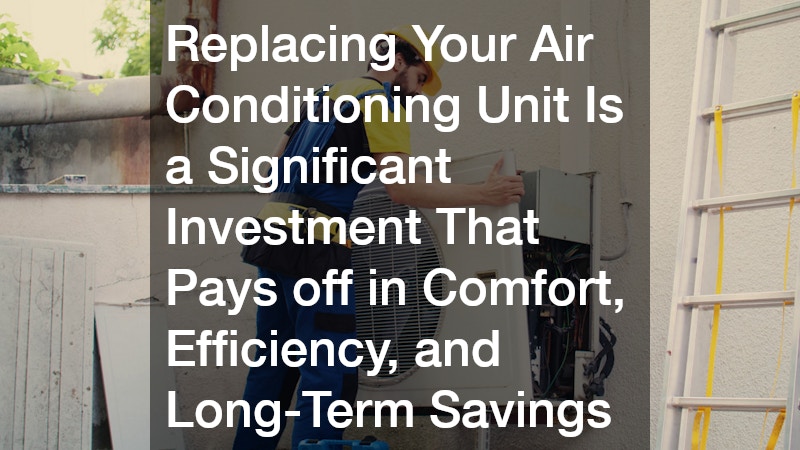Air conditioning plays a crucial role in maintaining comfort, especially during the hot summer months. While regular maintenance can keep your system running efficiently, there comes a time when repairs are no longer enough. Knowing when to replace your air conditioning unit can save you money in the long run and ensure you’re not left sweating on the hottest days of the year. Here are the key signs and factors to consider when deciding whether it’s time for a replacement.
1. Your Unit Is Over 10–15 Years Old
One of the most straightforward indicators that your air conditioning unit may need replacement is its age. Most systems are built to last between 10 and 15 years with regular servicing. If your system is within or beyond this range, it may begin to lose efficiency and require more frequent repairs. Modern units also come with improved energy efficiency and features that can significantly reduce your electricity bill, making an upgrade a worthwhile investment.
2. Frequent Repairs Are Adding Up
Every system needs occasional maintenance, but if you find yourself constantly scheduling repairs or replacing parts, your air conditioner may be on its last legs. Frequent issues like refrigerant leaks, electrical failures, and broken components not only cost money but also signal underlying wear and tear that a quick fix can’t resolve. At some point, it becomes more cost-effective to replace the unit entirely rather than continue patching it up.
3. Rising Energy Bills
If your electricity bills have been steadily increasing without a change in usage habits, your air conditioning system might be working harder than it should to cool your space. This loss in efficiency is common in older systems or those that haven’t been adequately maintained. Newer units, especially those with ENERGY STAR® certification, are designed to use significantly less energy. By investing in a replacement, you can cut down on monthly expenses while enjoying consistent comfort.
4. Uneven Cooling or Humidity Problems
An air conditioning system that no longer cools your home evenly or fails to manage indoor humidity could be struggling due to aging components or incorrect sizing. If some rooms are colder or hotter than others, or if you’re noticing excess moisture in the air, it may be a sign that your system can no longer keep up. Replacing it with a properly sized, high-efficiency model can solve these issues and improve overall comfort.
5. Strange Noises or Odors
Unusual sounds such as grinding, rattling, or squealing coming from your air conditioning unit shouldn’t be ignored. These noises often point to mechanical problems that could lead to system failure. Likewise, musty or burning odors can signal mold growth or electrical issues. While some problems may be repairable, recurring strange noises or smells typically suggest the system is no longer functioning safely or efficiently.
6. Your Home Has Undergone Significant Changes
If you’ve recently renovated, added new rooms, or changed your home’s insulation, your current air conditioning unit might no longer be the right size or type for your space. An undersized or oversized system can lead to inefficiencies, higher costs, and reduced comfort. In such cases, it’s wise to have a professional assess your current setup to determine if a new unit better suited to your updated home is necessary.
7. Environmental Considerations and Refrigerant Phase-Out
Older systems often use refrigerants like R-22, which have been phased out due to environmental concerns. If your unit relies on these outdated chemicals, it could become more difficult and expensive to maintain. Upgrading to a modern air conditioning unit that uses eco-friendly refrigerants helps reduce your environmental impact and ensures access to future servicing.
Replacing your air conditioning unit is a significant investment that pays off in comfort, efficiency, and long-term savings. If your current system is aging, inefficient, or constantly in need of repairs, it’s time to consider an upgrade. Consult a licensed HVAC professional to evaluate your current unit and recommend the best replacement options for your home’s needs and budget. By staying proactive, you can avoid unexpected breakdowns and enjoy a more comfortable and cost-effective cooling solution for years to come.
.

